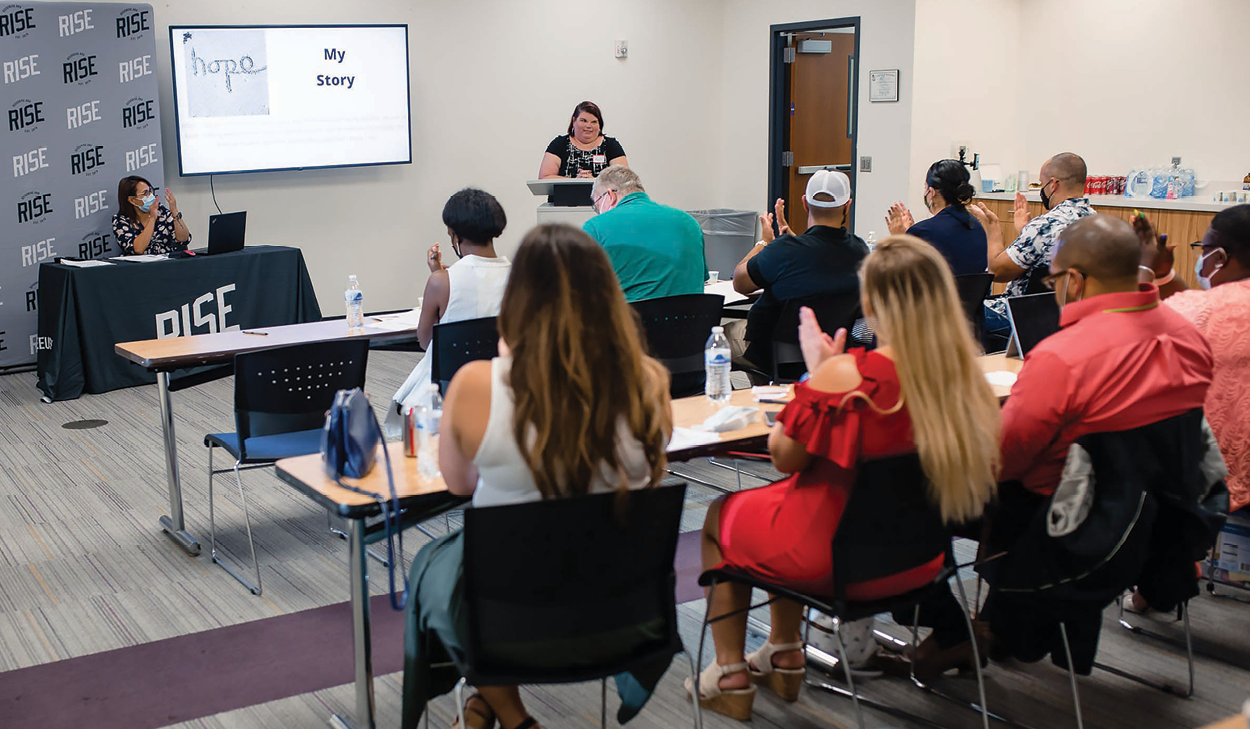
Participants in the RISE Business Academy pitch their developed business ideas to a panel of judges comprised of local business owners in the community. Image courtesy of RISE. Photo by McKenzie Ring.
A Path Forward
Research at UNO is increasing our understanding on how to assist formerly incarcerated persons in Nebraska to transition back into the community, find gainful employment and remain crime-free.
by Brandon Bartling
“I started looking at the fact of, where am I getting in this life? My daughter made it clear. If you continue to have the lifestyle you used to live, you will not be a part of your granddaughter’s life.”
“[My grandmother] was on her death bed and she wasn’t even worried about passing. She was more worried about me, and it just really touched me.”
These are stories shared with UNO researchers by 21 formerly incarcerated individuals who participated in one of Nebraska’s Vocational and Life Skills (VLS) programs. Researchers within the Nebraska Center for Justice Research (NCJR) at UNO’s College of Public Affairs and Community Service are using these one-on-one interviews to help state corrections officials assess how VLS programs prepared individuals for life after incarceration back in society and the workforce.
One participant enrolled after recognizing it was time for a change. “I know I’ve got a problem. There’s no sane person that goes back and forth to prison, five, six times,” she said. “I learned what it looks like when I’m not well. What it looks like when I’m healthy.”
But is her story an indication of broader VLS programming success? NJCR Research Coordinator Katelynn Towne, Ph.D., and colleagues broadly assessed the effectiveness and value of VLS programming. Through individual interviews, researchers learned how participants became involved in crime, why they enrolled in a VLS program and how the program helped them across five stabilizing factors: housing, employment/ education, mental health, substance abuse and supportive relationships.
“By taking a more holistic approach to measuring VLS programs, we were able to provide participants with an opportunity to reflect and discuss which aspects were the most impactful for them individually,” Towne said. “Individuals in VLS programming commit to changing for the better. Our research helps ensure that VLS programming successfully helps them fulfill that personal commitment.”
While every participant’s story may differ, five themes emerged from the interviews: personal development; selective social support; resilience and optimism; feeling ready for something better; and gaining employment. Participants highlighted the development of valuable basic life and interpersonal skills as well as vocational training in areas like construction, welding and computer proficiency to help after incarceration.
Importantly, the study identified structural issues that exist as barriers to those reentering society. For example, some employers may be hesitant to hire new employees with a criminal background, leading formerly incarcerated individuals to remain in low-paying jobs without benefits or possibly even reoffend. This critical barrier is the target of their next study. Future research will focus on barriers to successful employment from the employers’ perspective.
Ultimately, this research at UNO optimizes VLS programs for the future, ensuring they work effectively and efficiently. Successful VLS programs greatly benefit the state. They drive the state’s workforce as individuals reenter society and keep individuals out of trouble, reducing the prison population. These impacts add up to a strong benefit for Nebraska.
Towne co-authored this research alongside Michael Campagna, Ph.D., research associate at NCJR; Ryan Spohn, Ph.D., director of NCJR; and Amber Richey, a doctoral candidate in criminal justice at Indiana University Bloomington.